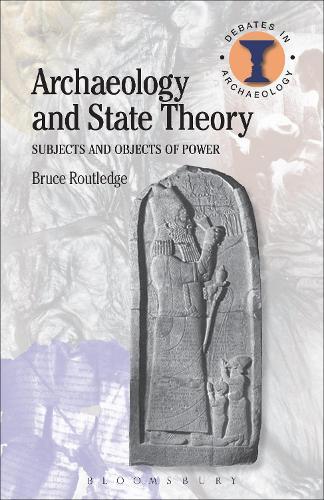Overview
After neo-evolutionism, how does one talk about the pre-modern state? Over the past two decades archaeological research has shifted decisively from check-list identifications of the state as an evolutionary type to studies of how power and authority were constituted in specific polities. Developing Gramsci's concept of hegemony, this book provides an accessible discussion of general principles that serve to help us understand and organise these new directions in archaeological research. Throughout this book, conceptual issues are illustrated by means of case studies drawn from Madagascar, Mesopotamia, the Inca, the Maya and Greece.
Full Product Details
Author: Bruce Routledge (University of Liverpool, UK)
Publisher: Bloomsbury Publishing PLC
Imprint: Bloomsbury Academic
Dimensions:
Width: 13.80cm
, Height: 1.80cm
, Length: 21.60cm
Weight: 0.390kg
ISBN: 9780715636336
ISBN 10: 0715636332
Pages: 208
Publication Date: 21 November 2013
Audience:
College/higher education
,
Undergraduate
Format: Hardback
Publisher's Status: Active
Availability: In Print

This item will be ordered in for you from one of our suppliers. Upon receipt, we will promptly dispatch it out to you. For in store availability, please contact us.
Reviews
It is a book rich in theoretical insights, supported via empirical case studies. The book represents a welcome addition to the bibliography ... It is a must-read for all readers interested in state-formation. -- Franco De Angelis, University of British Columbia * Bryn Mawr Classical Review * With this volume, Bruce Routledge has given archaeologists one of the most important works yet published on political archaeology ... More successfully than any other author I know, Routledge confronts archaeology's state theory bugbear and promotes a coherent blueprint for future studies of early complex polities that promises to be seminal ... Routlege expresses the hope that his work, though imperfect, will open the door to a better political archaeology ... Routledge has indeed opened this door and that Archaeology and State Theory will become a foundational text for future archaeological approaches to complex polities. -- Roderick B. Campbell * Archaeology Review from Cambridge *
It is a book rich in theoretical insights, supported via empirical case studies. The book represents a welcome addition to the bibliography ... It is a must-read for all readers interested in state-formation. -- Franco De Angelis, University of British Columbia Bryn Mawr Classical Review With this volume, Bruce Routledge has given archaeologists one of the most important works yet published on political archaeology ... More successfully than any other author I know, Routledge confronts archaeology's state theory bugbear and promotes a coherent blueprint for future studies of early complex polities that promises to be seminal ... Routlege expresses the hope that his work, though imperfect, will open the door to a better political archaeology ... Routledge has indeed opened this door and that Archaeology and State Theory will become a foundational text for future archaeological approaches to complex polities. -- Roderick B. Campbell Archaeology Review from Cambridge
Author Information
Bruce Routledge is Senior Lecturer in the School of Archaeology, Classics and Egyptology, University of Liverpool. He is the author of Moab in the Iron Age: Hegemony, Polity, Archaeology (2004).




